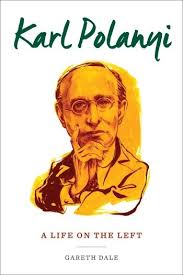Nikil Saval at The Nation:
 To search for Polanyi’s intellectual and political roots means coming into contact with a bewilderingly febrile left-wing intellectual milieu that appears to have little bearing on our present. However promising the current moment may seem with a self-described “democratic socialist” coming tantalizingly close to winning the Democratic Party’s presidential nomination, Gareth Dale’s new biography offers us a bracing reminder of a far richer world of socialist activity that once existed in much of the West. Debates over early-20th-century Hungarian socialism; the strategic plans of “Red Vienna”; the reformist 1961 platform of the Soviet Communist Party: These questions obsessed Polanyi and his contemporaries to a degree that seems almost inconceivable now and certainly residing in a sobering distance to our own immediate lives. Polanyi’s political activism and intellectual work were implicated in the widest questions debated on the left. The son of wealthy Hungarian Jews, he emerged as part of the “Great Generation” of Hungarian artists and intellectuals in Budapest at around the turn of the 20th century. John von Neumann, the mathematician, and Béla Bartók, the composer, were his contemporaries; so were the sociologist Karl Mannheim and the Marxist theoretician and literary critic György Lukács. Polanyi’s brother, Michael, became a philosopher of science, who for many years was better known than Karl.
To search for Polanyi’s intellectual and political roots means coming into contact with a bewilderingly febrile left-wing intellectual milieu that appears to have little bearing on our present. However promising the current moment may seem with a self-described “democratic socialist” coming tantalizingly close to winning the Democratic Party’s presidential nomination, Gareth Dale’s new biography offers us a bracing reminder of a far richer world of socialist activity that once existed in much of the West. Debates over early-20th-century Hungarian socialism; the strategic plans of “Red Vienna”; the reformist 1961 platform of the Soviet Communist Party: These questions obsessed Polanyi and his contemporaries to a degree that seems almost inconceivable now and certainly residing in a sobering distance to our own immediate lives. Polanyi’s political activism and intellectual work were implicated in the widest questions debated on the left. The son of wealthy Hungarian Jews, he emerged as part of the “Great Generation” of Hungarian artists and intellectuals in Budapest at around the turn of the 20th century. John von Neumann, the mathematician, and Béla Bartók, the composer, were his contemporaries; so were the sociologist Karl Mannheim and the Marxist theoretician and literary critic György Lukács. Polanyi’s brother, Michael, became a philosopher of science, who for many years was better known than Karl.
more here.
